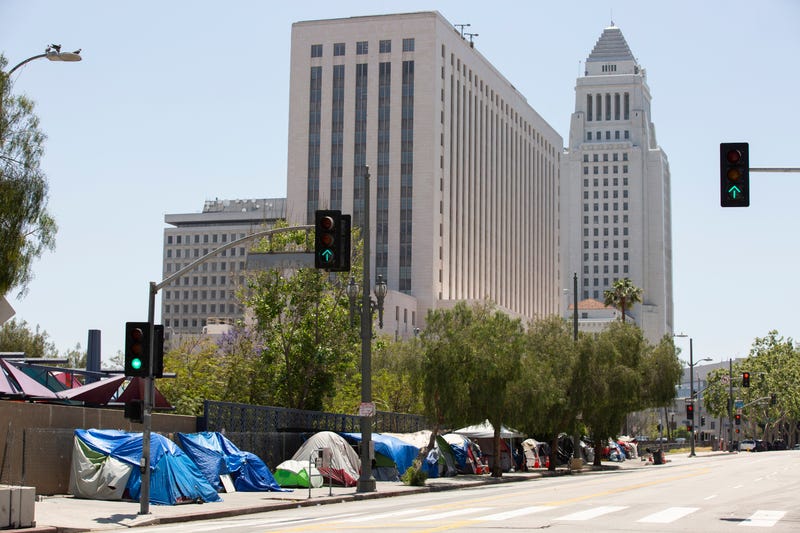
The Los Angeles City Council approved a plan Tuesday to have 12,915 beds available to people experiencing homelessness by June 2027, to meet obligations under the settlement of a federal lawsuit.
In a 14-0 vote with Councilwoman Heather Hutt absent, the council advanced a plan that aims to create more homeless beds using time-limited subsidies.
Want to get caught up on what's happening in SoCal every weekday afternoon? Click to follow The L.A. Local wherever you get podcasts.
The city must open an additional 2,093 beds as required by the L.A. Alliance Settlement.
"Essentially, the CAO (City Administrative Officer) has proposed we fill this gap with time-limited subsidies, which is both cost effective and has excellent outcomes for participants," said Councilwoman Nithya Raman, chair of the Housing and Homeless Committee. "This is an approach that I support."
Last week, the five-panel Housing and Homeless Committee approved the plan with some amendments such as requesting a cost analysis of homeless programs and to identify recommendations to fund the additional beds. Additionally, the plan calls for more safe-parking zones as respite sites for individuals living in their vehicles.
"That analysis needs to be done to ensure that we are spending our money wisely and keeping as many people housed as possible, especially at a time when we're seeing cuts at the state level and at the federal level that will impact us across our entire system," Raman said.
Raman submitted a letter to L.A. County officials urging them to take similar action, as the county works on its Measure A homeless spending plan. The county previously announced it would be reducing homelessness funding as a result of financial challenges.
"To cut these beds without asking these questions would be a disservice for housed and unhoused residents alike," Raman added.
Councilwoman Ysabel Jurado, who represents downtown neighborhoods, agreed with Raman, saying the updated bed plan remains flexible while raising concerns about its sustainability.
"If we're creating time-limited placements without a plan for what happens after two years, especially for residents on fixed incomes, we're simply kicking the can down the road," Jurado said.
Councilman Bob Blumenfield added that the plan gives officials the ability to revisit it to help families facing homelessness.
"If we use TLS properly, we could actually extend the time of the TLS using shared housing and other creative solutions," Blumenfield said.
Councilwoman Monica Rodriguez said it would be better if the city had a trusted partner that could help administer the program. The Los Angeles Homeless Services Authority currently oversees management of several of the city's contracts with homeless service providers and programs.
City officials have moved forward on various initiatives to stand up their own homeless department, and have improved oversight of homeless program outcomes and spending, among other measures. L.A. County has taken similar steps.
The councilwoman also urged her colleagues to address the issue of more families falling into homelessness.
"We have an obligation to have comprehensive conversations about the solutions that we're deploying and making sure that we have external partners that are actually effective and transparent about the use of our taxpayer dollars and helping fulfill these goals," Rodriguez said.
According to a report from CAO Matt Szabo, as of June 30, the city has 7,440 beds with another 3,776 in the process of coming online, totaling 11,216. If any of these beds are discontinued for any reason, replacement units will be needed.
To meet that gap, Szabo outlined a plan consisting of 130 non- congregate beds, 1,800 time-limited subsidies and 200 recreational vehicle time- limited subsidies for a total of 2,130 beds.
Szabo proposed city officials pursue time-limited subsidies as a way to add beds because of how cost-efficient they are, noting that it would cost approximately $24,309 per year compared to millions more used for the construction of Tiny Home Villages, modular residential units, as well as leasing motels and hotels as temporary shelter sites.
City officials set aside $29.2 million to fund beds as part of the L.A. Alliance Settlement. Szabo reported another $8.021 million in additional funding will be needed for the 2025-26 fiscal year to fund required beds. Future costs the city will need to contend with are estimated at $53.8 million in the 2026-27 fiscal year and nearly $29.6 million in the 2027-28 fiscal year.
The case started in March 2020 when L.A. Alliance -- a coalition of business owners and residents of the city and county -- filed a complaint in Los Angeles federal court against the city and Los Angeles County accusing them of not doing enough to address homelessness.
In June, U.S. District Judge David Carter determined that the city failed to meet its obligations under a settlement agreement with the alliance, and ordered officials to provide an updated plan detailing how they will create 12,915 beds for homeless residents within two years.
Carter wrote that the city has shown "a consistent lack of cooperation and responsiveness -- an unwillingness to provide documentation unless compelled by court order or media scrutiny."
The judge had previously threatened the city with appointing a receiver to oversee homeless funding and enforce compliance with the settlement, as requested by plaintiffs. Carter ultimately declined to do so, describing such action as a "last resort."
However, Carter did institute a "monitor" to oversee compliance, who would "ask the hard questions on behalf of Angelenos," the judge had written in his order.
Follow KNX News 97.1 FM
Twitter | Facebook | Instagram | TikTok
